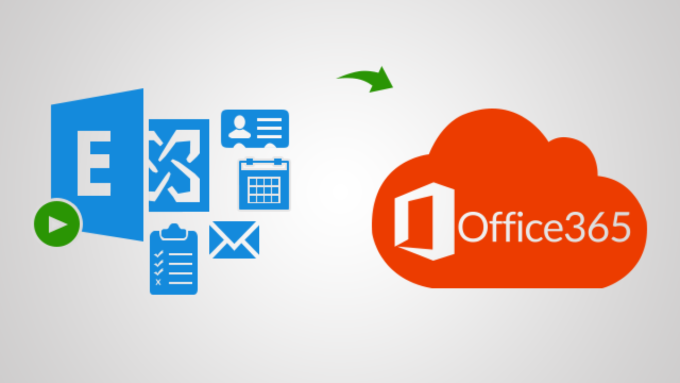Office 365 is a business tool that allows its users to seamlessly create, communicate, and share data while using the cloud. It is known as the best business tool in the market to communicate. It gives a vast and impressive range of functionalities for enterprise-level, and it also helps you to maximize your productivity that is the best combination for your business. Some companies already migrated to the cloud successfully, but still, other companies are waiting in line. Most of these companies are unable to understand the complexity of the office 365 migration itself, which can certainly be daunting. Before leaping, however, they need to focus on the critical benefits that migration to Office can offer.
Office 365 costs you less and gives you more benefits. You and all your employees will be able to work from anywhere and from any device connected to the internet.
Why migrate from Office to Office 365?

Most probably, the Office is the most common professional software used by different enterprises. It is used by both the smallest and the largest companies. You must take time while choosing the type of Office. The main reason for choosing 365 is the development logic and adequacy. Everyone knows the advantages of using the cloud.
A conservative business owner might be pleased to purchase a box to keep it in his hands. But you cannot ignore the benefits of distributed payments and transferring costs from the capital to operate. Additionally, no one can predict the future for any business that will happen in the next two or three years. Some companies bought the boxes or even licenses, but they found it not useful. Many of these boxes are now in the warehouses.
By using Office 365, you will be able to change the licenses every year or even every month if you want. Here are so many examples of how much companies are saving a significant amount by quickly reducing the number of requires subscriptions.
The world’s largest companies, with the most stringent requirements, are standardizing Microsoft solutions for productivity, connectivity, and sharing. IT professionals have already recognized the importance of migrating Office to Office 365. You can run your business more efficiently by using 365 as compared to individual software packages.
While using Office 365, you will be able to do your work from anywhere in the world. The cloud service fulfills all your needs for robust security, productivity, and 24/7 reliability. All these services are for subscription charges that will not be heavy on your pocket.
Doesn’t matter from where you are working, at the office or home, or even on the go, the excellent features of Office365 offer a substitute that is effective for buying and maintaining your software and servers. By using Office 365, you will be able to use the latest version of the software and also you can create, edit and share the data from any device you have like a PC, Mac, or your smartphones with anyone you want at the same time. 365 allows you, employees, to work from any device because of its productivity, communication, and collaboration tools.
Why hire a professional for the migration?

According to DuoCircle, while outsourcing the migration of Office to Office 365, you must consider some points especially if you are hiring an outside vendor. Here are some points to consider:
Experience
The process of migration of Office to Office 365 depends on your experience. Normally, Internal IT staff have less experience of doing these kinds of migrations as compared to external vendors who are specialists in this field.
Excellence
It is very important to ensure that the data is completely transferred while migrating the data. Successfully migrating the data means that you have transferred all the data, settings, and personalization items. Loosing some of these main characteristics may harm your business. Because a smooth migration ensures no loss of productivity and an incomplete migration which requires editing again in the settings will affect productivity negatively.
Effect on employee’s productivity
If issues arise during migration that results in user downtime, this can significantly impact your business. For each employee, every single hour counts for their productivity and if they lost their productivity due to downtime it will cause a decrease in revenue.
Decreased performance can be caused by missing data, downtime, or configuration problems.
Cost of IT staff

If your own IT staff is migrating Office to Office 365, they would not be available for other tasks required for the workplace. For instance, if the migration process takes more than 30 hours, it means that the IT staff will not be available for work at that time and it will ultimately affect productivity.
Tenant to Tenant Migration
Sometimes some administrators don’t find a proper way to migrate mailboxes from one tenant to another tenant when they need it. However, there are certain manual ways to do so but they are very complicated and time taking. You can see these types of queries in the forum of Microsoft. You can easily migrate your mailboxes from one Office, 365 tenants to the tenant.
Avoid the Risk’

If you don’t want to reduce your business productivity, you must outsource for the migration services and hire an expert to avoid the risk of low productivity or incomplete transfer of data.
There are many consultants in the market offering their services to migrate mailboxes, but if you have plenty of mailboxes to migrate it would cost you heavily. Even if they offer you some discount deals, the ultimate amount would be in thousands of dollars.
So, if you want to get migration services for Office to Office 365, just hire a professional and get yourself free from any tension of losing data, reduction in productivity, or fear of incomplete transfer of data or settings. Many companies have already shifted to the cloud because of their excellent services for productivity, communication, and sharing information with their employees.









